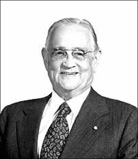 Charles Stark Draper (October 2, 1901 – July 25, 1987) was an American scientist and engineer, often referred to as "the father of inertial navigation." He was the founder and director of the MIT Instrumentation Laboratory, later renamed the Charles Stark Draper Laboratory, which under his direction designed and built the Apollo Guidance Computer for NASA, which made the Apollo moon landings possible.
Charles Stark Draper (October 2, 1901 – July 25, 1987) was an American scientist and engineer, often referred to as "the father of inertial navigation." He was the founder and director of the MIT Instrumentation Laboratory, later renamed the Charles Stark Draper Laboratory, which under his direction designed and built the Apollo Guidance Computer for NASA, which made the Apollo moon landings possible.
He attended Stanford University from which he earned a B.A. in psychology in 1922. After Stanford, he attended Massachusetts Institute of Technology (MIT), from which he earned an S.B. in electrochemical engineering in 1926, and an S.M. and Sc.D. in physics in 1928 and 1938 respectively.
He started teaching while at MIT, first as an assistant, then quickly became a full professor in aeronautical engineering in 1939. It was here that he founded the Instrumentation Laboratory in the 1930s, later spun off as The Charles Stark Draper Laboratory, Inc. In 1961, Draper and the Instrumentation Lab were awarded the first contract given out for the Apollo program to send humans to the moon, which had just been announced by President John F. Kennedy. This led to the creation of the Apollo Guidance Computer, a one-cubic-foot computer that controlled the navigation and guidance of the Lunar Excursion Module to the surface of the moon during six successful landings.
His interest in flight instrumentation also spun from becoming a pilot with an engineering training in the 1930s: although he failed to become an Air Corps pilot[2], he learned to fly by enrolling in a civilian course.
Draper invented and developed inertial navigation, a technology used in aircraft, space vehicles, and submarines which allows such vehicles to navigate by sensing changes in direction, using gyroscopes, and speed, using accelerometers. A pioneering figure in the aircraft engineering field, he also contributed to the Apollo space program with his knowledge of guidance systems. For his inventions and contributions, Draper was inducted to the National Inventors Hall of Fame in 1981.
He was awarded the Howard N. Potts Medal in 1960. In 1964, he was awarded the National Medal of Science.
The Charles Stark Draper Prize is a prominent prize in engineering devoted to the memory of Charles Stark Draper.